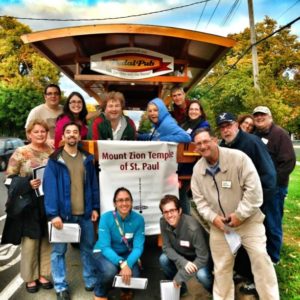Close your eyes for moment, and recall, if you can, the familiar chorus of the song “Tradition” from Fiddler on the Roof. Got it? For me, it evokes a sense of nostalgia and reminds me of the deep roots upon which my Judaism is grounded.
Now, let’s take “Tradition” and remix it. Let’s add an electronic drumbeat, some club-thumping synths, and some Auto-tune to the vocals. Let’s throw it up on Youtube with images of cats in kippahs. Now, what feelings come to mind? Personally, I’m filled with a strange discomfort—a jarring sensation of a message that is at once both inherently conservative yet uniquely modern. Welcome to the dilemma of the Modern Jew. Each week, I struggle with a balance between observing traditional Jewish customs with finding ways to ensure that my religion is relevant in the modern world. Should we, as Modern Jews, adhere to the traditions or be empowered to redefine Judaism as reflected through our individual perspectives and philosophies?
 To use Tevye’s method of dissecting a problem, on the one hand, Judaism is an ancient religion. We, as Jews, define ourselves by our ability to act within a unified community where our practices bind us to each other and God. By bending Judaism to the aesthetics of a modern world, it loses its identity and ceases to be the community-defining force it has traditionally been.
To use Tevye’s method of dissecting a problem, on the one hand, Judaism is an ancient religion. We, as Jews, define ourselves by our ability to act within a unified community where our practices bind us to each other and God. By bending Judaism to the aesthetics of a modern world, it loses its identity and ceases to be the community-defining force it has traditionally been.
On the other hand, its practitioners, whether they like it or not, are members of a modern society containing smartphones, instant status updates, and a belief that all people are entitled to equal and fair treatment regardless of race, gender, sexual orientation, or religion. We, as Americans, must ensure that our religious practice is in harmony with the secular aspects of our lives. If religion cannot be flexible, it will break under the tension of these aspects. Only by adapting our religion to modern sensibility can we ensure it continues and thrives in the ages to come.
On the other hand, the more flexible we make the religion, the less of a cohesive community we are. This continuity is the defining feature of a religion; otherwise, why wouldn’t everyone just choose the personal philosophy that best suits their needs?
So, what’s the answer? For me, it’s balance. There is a teaching that everyone should carry two sayings in each of their pockets. In the first, carry a note that says, “For my sake was the world created.” In the second, carry a note that says, “I am but dust and ashes.” I would update this teaching with the following notes: first, “I am a follower of Jewish practices. It is  not my role to reshape what has been passed to me from previous generations.” And, on the second: “I am a modern Jew, responsible for maintaining its practice by future generations. I must ensure its relevance and vitality by translating traditions to contemporary life.” Through this balance, I hope to keep the bigger picture in mind as I define my Judaism.
not my role to reshape what has been passed to me from previous generations.” And, on the second: “I am a modern Jew, responsible for maintaining its practice by future generations. I must ensure its relevance and vitality by translating traditions to contemporary life.” Through this balance, I hope to keep the bigger picture in mind as I define my Judaism.
If you have any thoughts, answers, or ruminations on this subject please leave them below. Also, if you want to experience some collision of traditional and modern Judaism, you can join Noazim and me on a Parashah Pedal Pub, where we combine the traditional study of Torah with the thoroughly modern pedal pub. You can get more details on our Facebook page. Finally, send me a note if you stumble across the Tradition Remix feat. Cats in Kippahs video. I’d love to send it to my Bubbie.

